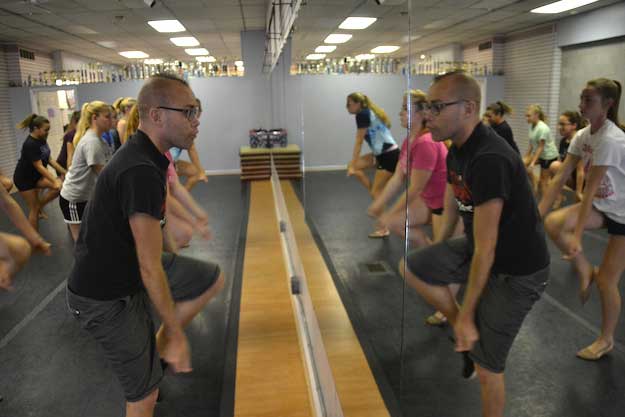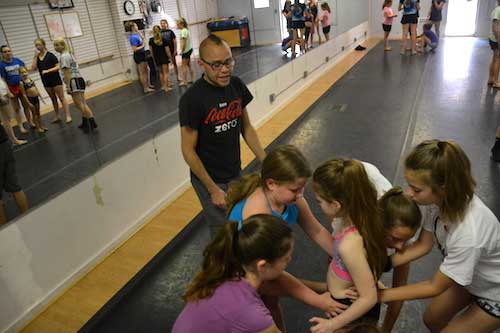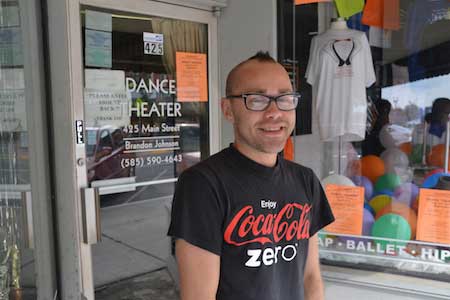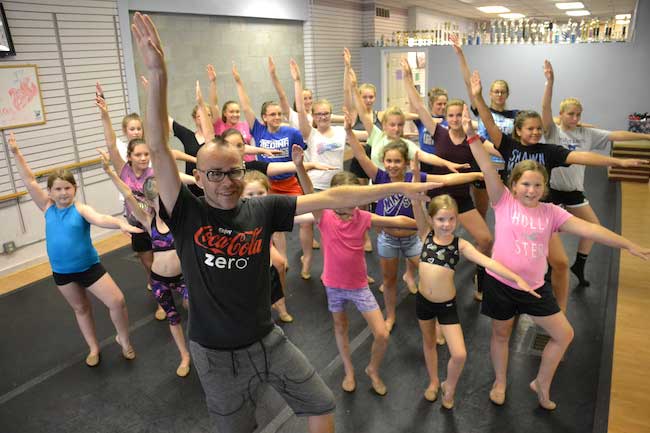Q&A: Owner of Dance Theater in Medina has students aiming high
Brandon Johnson opened the studio 15 years ago
MEDINA – Brandon Johnson, 34, was 19 when he opened his own dance studio in Medina. A decade ago he bought a building at 425 Main Street, and Dance Theater has been a fixture in the downtown, a part of the business district’s renaissance. (Many of the parents will go to restaurants and shops on Main Street while their kids take classes.)
Johnson works with about 130 children, including 25 in a competitive dance group. Those 25 will be going to Orlando, Fla. in October for the Disney Performing Arts Program. The Dance Theater group will perform in three age levels: minis are 7 to 9 years old, while juniors are 9 to 12, and seniors, 13 to 17.
(Some of his dancers have competed at national events at Atlantic City; Hershey, Pa; and Wildwood, NJ. They have brought home national titles through StarQuest and DanceXplosion.)
Johnson sat down for an interview recently before a high-energy rehearsal with his dancers, who are getting ready for Disney.
Question: I wonder how you got into dance and were you thinking this would be your career?
Answer: I started performing at the age of 8. I got serious about performing in my junior year of high school. I was actually going to go to college to be an art teacher but that changed a few weeks before classes started and I decided I wanted to be a dance major. So I auditioned and was accepted into the dance program at SUNY Brockport. The opportunity came to open a studio here because a couple of studios had closed. So I jumped in and opened it. When I opened it, I didn’t imagine I’d be where I am today.
Question: Did you get your degree at Brockport?
Answer: Yes.
Question: You juggled that while doing this business as a 19-year-old?
Answer: Yes. Looking back I’m not sure how I did it, but I somehow did it and was able to graduate.
Question: You graduated in 4 years?
Answer: I did.

Brandon Johnson leads a dance class at the Dance Theater, which he opened when he was 19.
Question: I know you are also the talent show chairman at the Orleans County 4-H Fair.
Answer: Yes, and I am the entertainment coordinator overall for the fair so I book all of the entertainment on the grounds, so it’s not just the talent showcase – the miniature horse show, the magic show, all of the bands.
Question: Why are you willing to do that? Were you in 4-H as a kid?
Answer: I was in 4-H when I was younger. And then the opportunity came to join the Fair Board and I kind of just fell into the entertainment chairperson’s spot. It’s different from running a dance studio and I enjoy it, but it’s still the same realm of entertainment.
Question: How long have you been doing that?
Answer: I think this is year 8 or 9.
Question: What do you like about that role?
Answer: It’s meeting a lot of entertainers from across the U.S. who have similar interests in the entertainment industry, and hearing their stories.

Provided photo: Dance Theater students are shown performing at Disney World in July 2014.
Question: Are you the teacher/choreographer at your studio?
Answer: Here I would call myself the studio director, and I do choreograph some dances, but I have staff because I am not Superman. There is no way I can teach and choreograph classes six days a week for two studios. We have two rooms running here. There is no way I could choreograph that many dances on my own. I do have a staff that works under me to help me out.
Question: Were you a one-man show when you first opened?
Answer: For a while I was. When I opened I was very, very small, but as the years grew, my reputation grew and I am where I am today I feel because of that reputation I have. I knew I couldn’t do it on my own so I hired staff. They staff I have now I’ve had for four or five years now.
Question: How many people do you have on staff?
Answer: I have six people on staff, including myself.
Question: Why do you think you’re successful?
Answer: It’s a passion. With a passion it’s something you enjoy doing, and you put your all into it. Performance is something I’ve always done.
Question: I notice there are some studios that really push for excellence and want to win competitions, including at the State Fair.
Answer: I think it’s a matter of preference. Some kids may go to dance for fun. Some kids may come to dance for fun, but they want a little extra, so that’s why I have recreational classes and competition classes. Those competition classes are for kids that want a little extra and want to push a little harder, and strive for a little but more.
To be on the competition team isn’t mandatory for anybody, but the kids on the competition team want to be there, they want to work towards that extra step towards perfection.
Question: How does the competition season work?
Answer: Each competition season kicks off in February-March. We do three regional competitions that we keep local, usually Buffalo-Rochester-Niagara Falls-Syracuse. We also do a Nationals competition every summer and this year we did Lake George. But we’ve done other Nationals in Wildwood, New Jersey; Atlantic City, New Jersey; Pennsylvania; Ohio; it just depends where we travel.

Brandon Johnson gives tips to his dancers who are working on a lift, one of the many moves for their competitive dance program.
Question: How many on the competition team?
Answer: The competition team is 25.
Question: I think you’re unusual being a man who owns a dance studio. Maybe I’m wrong about that.
Answer: I would say I’m one of very few. I think you see it more often today than 15 years ago. But I would say I’m one of very few in the area who is a male studio director.
Question: It seems like 95 percent of the kids in dance are girls.
Answer: That is correct. To find a male dancer is very rare. A lot of male dancers you find at ages 4 or 5 because mom and dad wanted them to try something different. And then as they get older that kind of dwindles out because dancing for boys isn’t as popular as baseball, soccer or football. But when you think about it agility-wise, if you take a dance class and pair that with sports, the coordination you get with dance would definitely help your agility with other sports you’re playing. I don’t think a lot of people realize that and that is something to think about.
Question: I’ve heard that from other athletes, who said dance helped them to be better in sports.
Answer: It helps with flexibility and coordination, muscle movement and muscle memory. You get a little bit better recognition of your body and the way your body works and moves. It can definitely help you on the field and with whatever sport you’re playing.
Question: I wonder how you got into it as a kid?
Answer: I had a couple friends who were males who got into dancing. I decided I wanted to dance, too. So I joined a dance class. They dwindled out and I stuck with it.
Question: Why did you keep going?
Answer: I think it was the artistic portion of it. I’ve always been an artistic kid who was interested in art. When I was in high school I took a lot of art classes. I think dance is one way to express yourself in an artistic fashion. That is one reason why I stuck with it because I’ve always been an artistic person.

Brandon Johnson bought the building at 425 Main St. a decade ago.
Question: Did you get any flak or pushback for being a trailblazer locally?
Answer: I got some flak but dance was something I enjoyed doing and I wasn’t going to give that up based on something someone else said. If it was something I didn’t enjoy, I wouldn’t be doing it and I wouldn’t be doing it today. It’s something that brought me to where I am today. I really don’t regret any decisions I’ve made in the past to bring me where I am today.
Question: Were you tempted to work in a city as an artistic person?
Answer: That very well could have happened, but I opened here and the opportunity to teach was here for me so I didn’t need to go anywhere else. You can only be at one place at one time especially with running a studio and keeping things running smooth here. There’s not a lot of room for you to be in two places at once.
I do judge for two national talent competitions across the East Coast right now but that’s because I have a great staff behind me here. So when those opportunities come up for me to go judge for one weekend, I have a staff here who can take care of the business for those two or three days that I’m gone.
Question: What makes a dance team good? What are you looking for as a judge?
Answer: Technique – good dance technique. Great training. And just entertainment on stage. You can tell when you’re watching a dance number on stage and there’s a group of dancers that just love what they’re doing, and when there’s a group of dancers up there because they have to dance. There’s a huge difference between that.
The kids that compete really, really love what they’re doing, and they go up on stage every time and give a great performance. You can tell that’s what they enjoy.
That’s not to say our recreational kids don’t enjoy what they’re doing, but they just want to come and dance and not be pushed as hard as the team kids are pushed.
I will admit my teams kids are here two to three times a week in classes for four, five, six, seven hours at a time, learning extra choreography, and technique, and jumps and turns to make sure when they go out on stage they are showing the judges they are getting a very good dance education.
Question: What about all these trophies in here?
Answer: They’re from all the different competitions we’ve been in. And we have a display window in front as well.
Question: Looks like you guys do pretty well.
Answer: We’ve won some pretty big awards. I train them but they go out and win the awards. I give them the passion I have. I’m giving them what I enjoy doing: performing. Growing up I performed and I competed, and I’m just passing that on to them.
Question: Is this a tough business?
Answer: Yeah, I think so because every town has a dance studio or dance studios. There are several dance studios here in Medina. There are several in Albion. There are studios all over. People have a choice with where they want to go, just like with the airlines – they have a choice. I think my reputation speaks for itself and people come here for a reason. I have a huge following of students who come back year after year and I’m grateful and humble for that. I’m going to keep doing what I’ve been doing and what I enjoy doing, with the hope to keep it going another 15 years.




























































